Why It’s Ok If Your Side Hustle Fails

A 2025 survey by Finder UK found that over 39% of UK adults had started a side hustle, and that number’s growing fast. But starting something is one thing. Making it last is another.
Most side hustles don’t become long-term businesses. Some never make money. Others just fizzle out when life gets in the way. But that doesn’t mean they’re a waste of time.
But what if your hustle failing was actually a good thing? What if it gave you the tools, insights, and direction you needed to make your next move the right one?
In this article, I’ll talk about why it’s completely fine if your side hustle doesn’t take off – and why you’re still coming out ahead.
Just starting out and not sure where to begin – find out how to take the first steps here!
Failing at a Side Hustle Doesn’t Make You a Failure
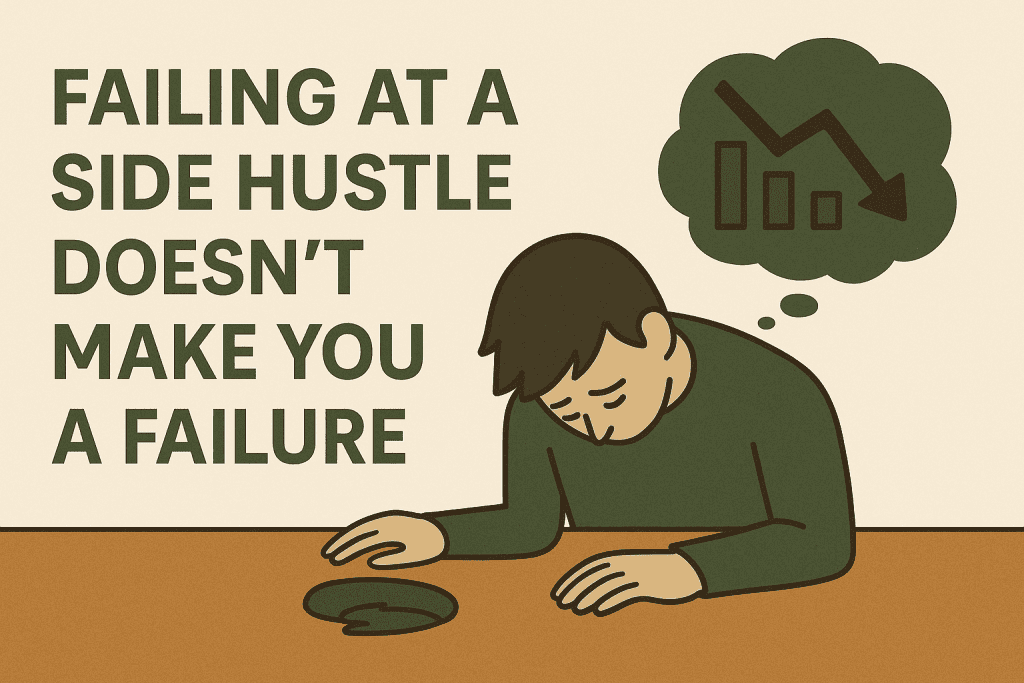
When a side hustle doesn’t work out, it’s easy to take it personally. But failing at a project isn’t the same thing as being a failure. Most people don’t get things right on the first try, especially when they’re learning something new. Your worth isn’t tied to how profitable or long-lasting a side hustle is. It’s just one attempt, not the whole story.
Just because your side hustle didn’t work doesn’t mean you’re not good enough. There’s a big difference between failing at something and being a failure.
Most side hustles don’t succeed right away. In fact, many successful entrepreneurs had plenty of flops before they struck gold. Think about people like Sara Blakely, who sold fax machines door-to-door before creating Spanx. Or Walt Disney, whose first animation studio went bankrupt.
Your hustle isn’t your identity: it’s one project, not your entire worth. It can be easy to tie your self-esteem to your success, especially when people online seem to be earning six figures from side gigs. But what you don’t see are the years of trial and error that usually come before those wins.
Actionable Tip: Start treating each project like an experiment. Set goals, but remind yourself that the result doesn’t define you. Give yourself permission to be human – and to try again.
Every Side Hustle Gives You Useful Skills
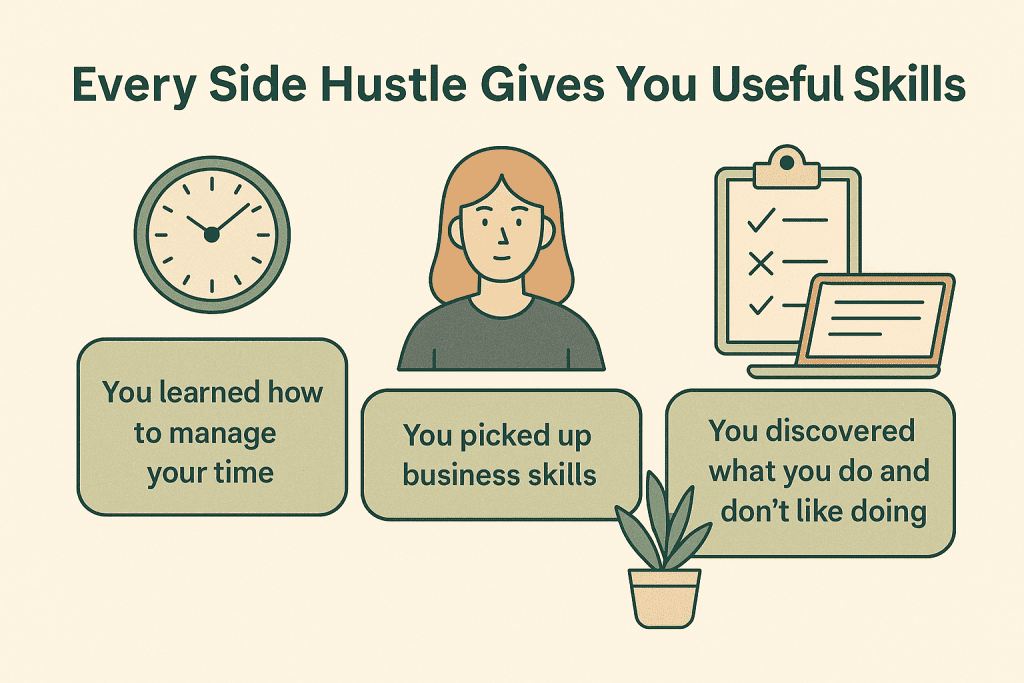
Even if your side hustle didn’t last, you’ve probably picked up skills that’ll be useful in future projects. Time management, content creation, basic finance, and problem-solving all come into play. You might have also learned more about your own interests and working style, which helps guide what you try next.
You learned how to manage your time: balancing a full-time job and a part-time gig forces you to get better at scheduling. You probably got better at using calendars, staying organised, and squeezing more into your day.
You picked up business skills: running a side hustle teaches you how to build a website, market a product, talk to customers, and maybe even handle invoices and taxes. None of that knowledge disappears just because the hustle didn’t work out.
You discovered what you do (and don’t) like doing: maybe making candles wasn’t for you – but social media content around it was. Small discoveries like this help steer you in a better direction next time.
Actionable Tip: Make a list of all the skills you picked up from your side hustle. This helps reframe the experience and reminds you that “failure” often just means learning in progress.
Losing Money Isn’t the End of Your Financial Story
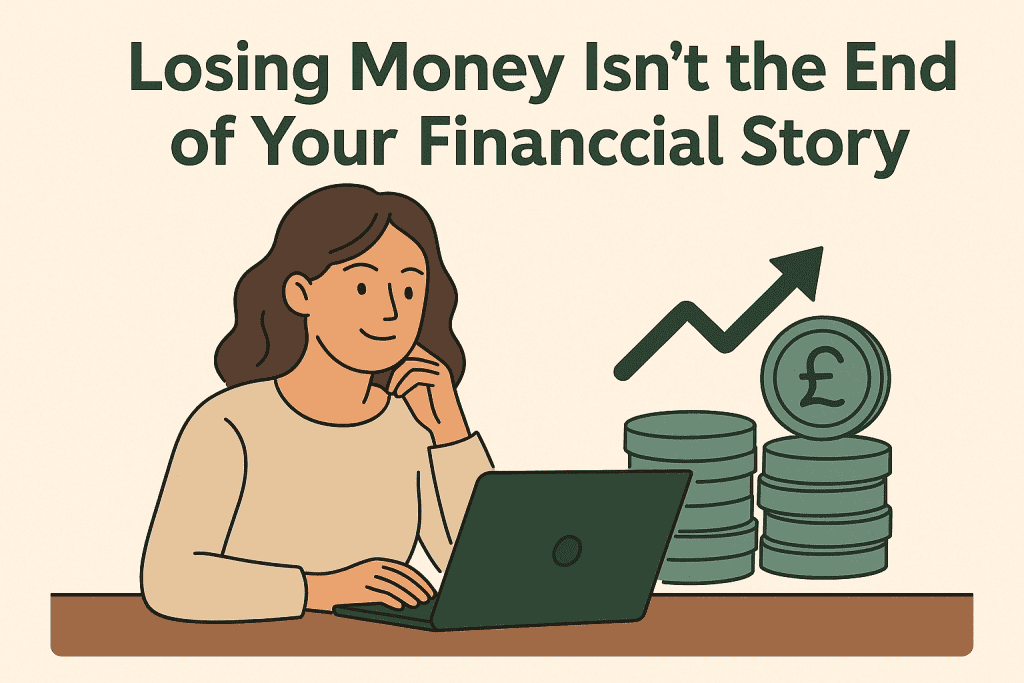
Spending money on a failed hustle can feel like a setback, but it doesn’t have to be a disaster. Treat that spend like tuition-hands-on learning that teaches you what to do differently next time. Keeping your costs low and tracking what you’ve spent can help you take lessons from the loss rather than regret.
Keep your startup costs low: before launching anything, set a cap. For example, decide that you’ll only invest £300 to test the idea. This helps you bet small while still giving the idea a real chance to work.
Consider it an investment in yourself: that £300 went toward learning how to build a Shopify store, using Canva, testing Facebook ads, or buying your first round of inventory. These are transferable skills.
Recover smarter:
- Track your spending: go back and tally up how much you spent. Don’t guess – be accurate.
- Cut unused tools: cancel any subscriptions you’re no longer using (like design tools or email services).
- Sell what you can: got leftover stock or gear? Try reselling it on Facebook Marketplace or eBay to recoup some costs.
Money can be earned back. But what your hustle gave you – skills, insights, and fresh ideas – can stick with you forever.
You Walk Away With Clarity and Confidence
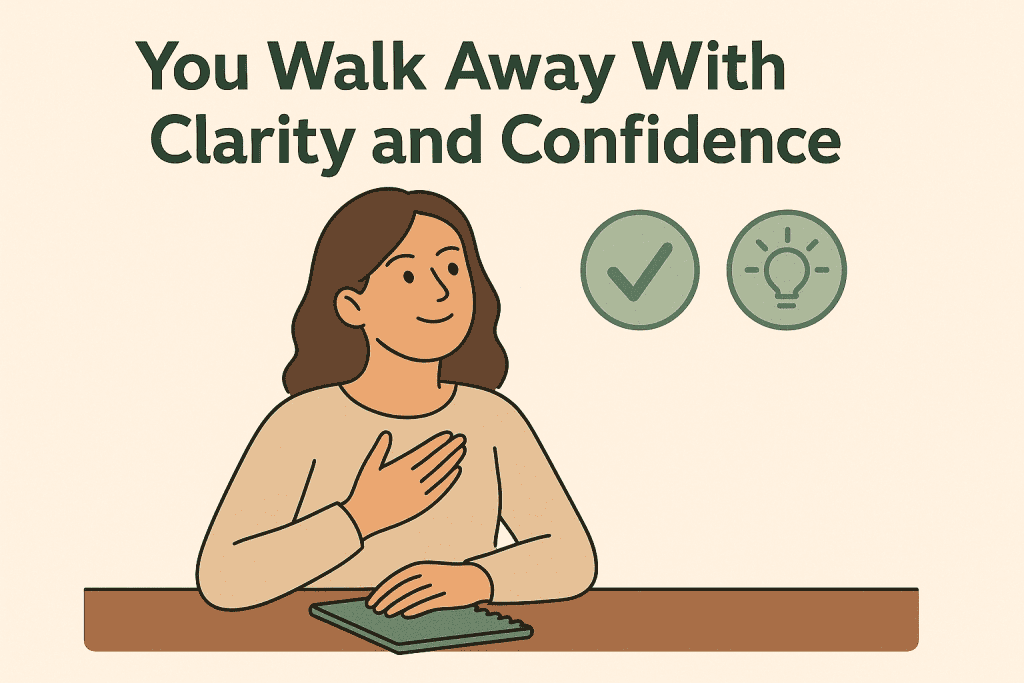
There’s a lot of value in simply starting something. Taking a swing at a side hustle means you’ve already overcome hesitation, self-doubt, and the urge to wait for the perfect time. Even if it didn’t go anywhere, you’ve now got more clarity about what works for you – and what doesn’t. That kind of insight makes your next attempt stronger.
Now you know what doesn’t work: that kind of clarity is priceless. It saves you from going years down a path that wasn’t even meant for you.
You’ve gotten over the fear of starting: you launched something. You told people about it. You maybe even sold your first product or service. That’s way more than most people ever do.
You reconnected with your values: maybe your hustle failed because it didn’t actually align with your lifestyle or priorities. That’s okay. Now you have better insight into what matters more to you – like freedom, time with family, or creativity.
Actionable Tip: Write down what you now know you don’t want from a job, project, or client. Then, list what felt good or exciting. This becomes your filter for future ideas.
A Failed Side Hustle Can Lead You to the Right One

Side hustles that don’t work out often lead to better ideas. You test an approach, learn from the result, and adjust course. Sometimes the market isn’t ready, or the timing’s off, or the idea just needs tweaking. Over time, you get better at filtering your ideas and spotting the ones that actually match your skills and lifestyle.
You might shift toward something better: many people turn failed ideas into winning ones. Ever heard of Instagram Burbn? Probably not – it was the app Instagram started as. It completely flopped… until the founders pivoted to just the photo sharing part. That worked.
Timing matters more than people admit: maybe your idea was good, but the moment wasn’t right. Your audience might not have been ready, the market could’ve been slow, or maybe you were in a busy phase of life.
You’ve built a better filter now: once you’ve tried something, you get better at spotting what’s worth doing and what’s not. You start thinking differently about time, energy, and where to place your efforts.
Actionable Tip: Before jumping into your next side hustle, run your idea through a quick checklist:
- Does this idea excite me?
- Is there a market for this right now?
- Can I realistically do this with the time and energy I have?
How to Move On Without Beating Yourself Up

Failure hurts – especially when you’ve invested time, money, or told others about your plans. But you don’t need to carry that around. Some projects are there to teach you something, not to last forever. Giving yourself space to pause and reset is often the best way to figure out what’s next – without putting pressure on yourself to get it perfect.
Not everything is meant to scale: some projects are stepping stones, not destinations. If you got what you needed (clarity, confidence, or closure), it wasn’t a waste.
Drop the perfectionism: you don’t need a flawless record to make progress. Some of the best entrepreneurs have long lists of failed projects before they found the one that stuck.
Set new expectations: saying “my next hustle has to make money in 30 days or I’ll quit” puts huge pressure on you. Instead, set softer goals – like learning one new skill, testing a new platform, or connecting with five people in your niche.
Actionable Tip: Give yourself a 2-week cool-off period. Pause any new big ideas. Use this time to reflect, rest, and recharge so you can come back with a clear head.
You’re Not Starting Over-You’re Starting From Experience
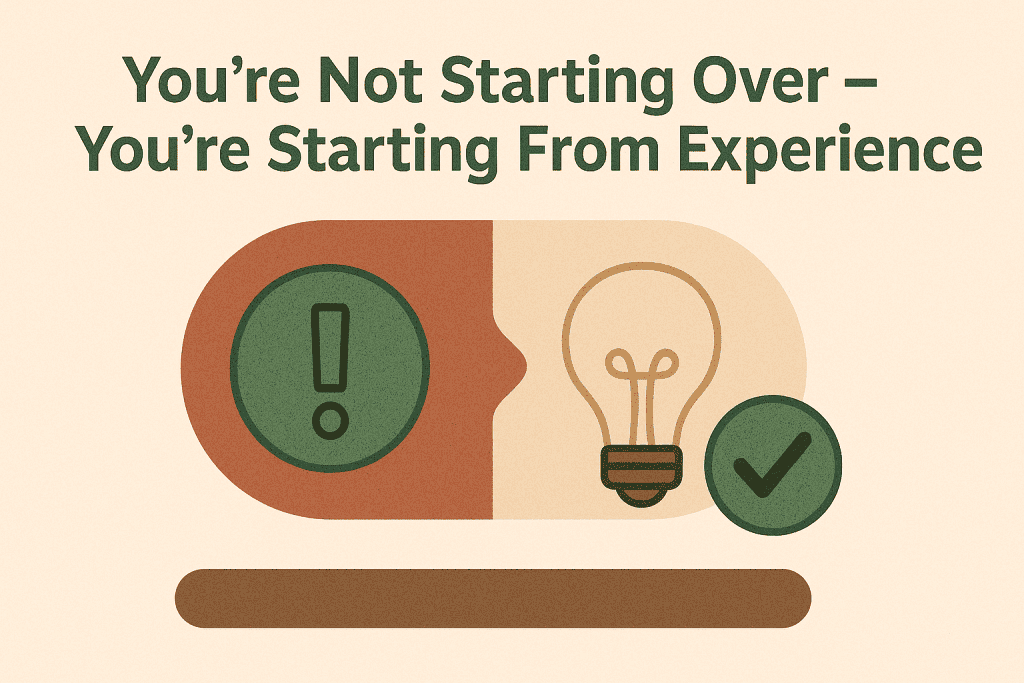
It hurts when your side hustle doesn’t work. But it’s not the end of anything. You still gained insight, skills, and confidence. You probably saved yourself from spending years on something that wasn’t quite right.
So if your hustle flopped? Good. That means you tried. That means you learned. That means you’re ahead of most people who are still stuck in “what if.”
Pick up the lessons, shake off the pressure, and get ready for what’s next. You’re doing better than you think.





